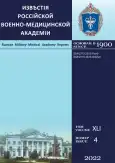Роль короткоцепочечных жирных кислот в патогенезе болезни Паркинсона
- Авторы: Красаков И.В.1,2, Литвиненко И.В.1, Родионов Г.Г.2, Давыдова Н.И.2, Алексанин С.С.2
-
Учреждения:
- Военно-медицинская академия
- Всероссийский центр экстренной и радиационной медицины им. А.М. Никифорова
- Выпуск: Том 41, № 4 (2022)
- Страницы: 439-444
- Раздел: Научные обзоры
- URL: https://journal-vniispk.ru/RMMArep/article/view/111854
- DOI: https://doi.org/10.17816/rmmar111854
- ID: 111854
Цитировать
Полный текст
Аннотация
Болезнь Паркинсона тесно связана с дисфункцией энтеральной нервной системы и дисбиозом микробиоты кишечника. Короткоцепочечные жирные кислоты являются основными метаболитами, образующимися в результате ферментации пищевых волокон бактериями кишечника, и предположительно играют ключевую роль в перекрестном взаимодействии кишечника и мозга. В статье представлен обзор литературы, посвященной изучению вклада короткоцепочечных жирных кислот в патогенез болезни Паркинсона. Обсуждается, что у пациентов с болезнью Паркинсона концентрация ацетата, пропионата и бутирата в плазме выше, чем в контрольной группе. Данные изменения коррелируют с тяжестью клинической картины болезни Паркинсона, уровнем провоспалительных бактерий кишечника и провоспалительных цитокинов. Причиной таких изменений, возможно, является избыточное заселение кишечника пациентов с болезнью Паркинсона такими бактериями, как клостридии и руминококки, что приводит к регуляторным иммунным реакциям, воспалению кишечника, повышенной проницаемости кишечного барьера, избыточному поступлению в первую очередь пропионата в центральную нервную систему и активизации нейровоспаления. Продемонстрирована важность дальнейшего изучения взаимосвязи изменений метабиоты кишечника, ее метаболома, Т-клеточного звена иммунной системы у пациентов с болезнью Паркинсона. Обосновано исследование плазмы крови пациентов с болезнью Паркинсона именно с помощью метода газовой хромато-масс-спектрометрии для истинной, клинически значимой оценки взаимодействия «кишечник–мозг».
Полный текст
Открыть статью на сайте журналаОб авторах
Игорь Вячеславович Красаков
Военно-медицинская академия; Всероссийский центр экстренной и радиационной медицины им. А.М. Никифорова
Email: ikrasakov@gmail.com
ORCID iD: 0000-0001-6092-0659
SPIN-код: 9891-8300
Scopus Author ID: 26642102200
ResearcherId: I-8865-2016
канд. мед. наук
Россия, Санкт-Петербург; Санкт-ПетербургИгорь Вячеславович Литвиненко
Военно-медицинская академия
Автор, ответственный за переписку.
Email: litvinenkoiv@rambler.ru
ORCID iD: 0000-0001-8988-3011
SPIN-код: 6112-2792
Scopus Author ID: 35734354000
ResearcherId: F-9120-2013
докт. мед. наук, профессор
Россия, Санкт-ПетербургГеннадий Георгиевич Родионов
Всероссийский центр экстренной и радиационной медицины им. А.М. Никифорова
Email: rodgengeor@yandex.ru
SPIN-код: 6471-3933
докт. мед. наук
Россия, Санкт-ПетербургНаталия Ивановна Давыдова
Всероссийский центр экстренной и радиационной медицины им. А.М. Никифорова
Email: davydova777@yandex.ru
ORCID iD: 0000-0001-8644-905X
SPIN-код: 7914-5866
канд. мед. наук
Россия, Санкт-ПетербургСергей Сергеевич Алексанин
Всероссийский центр экстренной и радиационной медицины им. А.М. Никифорова
Email: medicine@nrcerm.ru
ORCID iD: 0000-0001-6998-1669
SPIN-код: 1256-5967
докт. мед. наук, профессор, чл.-корр. РАН
Россия, Санкт-ПетербургСписок литературы
- Rietdijk C.D., Perez-Pardo P., Garssen J., et al. Exploring Braak’s Hypothesis of Parkinson’s Disease // Front. Neurol. 2017. Vol. 8. P. 37. doi: 10.3389/fneur.2017.00037
- Sampson T.R., Debelius J.W., Thron T., et al. Gut Microbiota Regulate Motor Deficits and Neuroinflammation in a Model of Parkinson’s Disease // Cell. 2016. Vol. 167, No. 6. P. 1469–1480.e12. doi: 10.1016/j.cell.2016.11.018
- Unger M.M., Spiegel J., Dillmann K.U., et al. Short chain fatty acids and gut microbiota differ between patients with Parkinson’s disease and age-matched controls // Parkinsonism Relat. Disord. 2016. Vol. 32. P. 66–72. doi: 10.1016/j.parkreldis.2016.08.019
- Thursby E., Juge N. Introduction to the human gut microbiota // Biochem. J. 2017. Vol. 474, No. 11. P. 1823–1836. doi: 10.1042/BCJ20160510
- Louis P., Flint H.J. Formation of propionate and butyrate by the human colonic microbiota // Environ. Microbiol. 2017. Vol. 19, No. 1. P. 29–41. doi: 10.1111/1462-2920
- Dalile B., Van Oudenhove L., Vervliet B., Verbeke K. The role of short-chain fatty acids in microbiota-gut-brain communication // Nat. Rev. Gastroenterol Hepatol. 2019. Vol. 16, No. 8. P. 461–478. doi: 10.1038/s41575-019-0157-3
- Shin C., Lim Y., Lim H., Ahn T.B. Plasma Short-Chain Fatty Acids in Patients with Parkinson’s Disease // Mov. Disord. 2020. Vol. 35, No. 6. P. 1021–1027. doi: 10.1002/mds.28016
- He X., Qian Y., Xu S., et al. Plasma Short-Chain Fatty Acids Differences in Multiple System Atrophy from Parkinson’s Disease // J. Parkinsons Dis. 2021. Vol. 11, No. 3. P. 1167–1176. doi: 10.3233/JPD-212604
- Красаков И.В., Литвиненко И.В., Родионов Г.Г., и др. Оценка микробиоты кишечника у пациентов с болезнью Паркинсона с помощью метода газовой хромато-масс-спектрометрии // Анналы клинической и экспериментальной неврологии. 2018. T. 12, № 4. C. 23–29. doi: 10.25692/ACEN.2018.4.3
- Chen S.J., Chen C.C, Liao H.Y., et al. Association of Fecal and Plasma Levels of Short-Chain Fatty Acids with Gut Microbiota and Clinical Severity in Patients with Parkinson Disease // Neurology. 2022. Vol. 98, No. 8. P. e848–e858. doi: 10.1212/WNL.0000000000013225
- Kelly L.P., Carvey P.M., Keshavarzian A., et al. Progression of intestinal permeability changes and alpha-synuclein expression in a mouse model of Parkinson’s disease // Mov. Disord. 2014. Vol. 29, No. 8. P. 999–1009. doi: 10.1002/mds.25736
- Kim C.H., Park J., Kim M. Gut microbiota-derived short-chain Fatty acids, T cells, and inflammation // Immune Netw. 2014. Vol. 14, No. 6. P. 277–288. doi: 10.4110/in.2014.14.6.277
- Lindenberg F., Krych L., Fielden J., et al. Expression of immune regulatory genes correlate with the abundance of specific Clostridiales and Verrucomicrobia species in the equine ileum and cecum // Sci. Rep. 2019. Vol. 9, No. 1. Art. 12674. doi: 10.1038/s41598-019-49081-5
- Красаков И.В., Давыдова Н.И., Калашникова А.А., и др. Особенности показателей врожденного и адаптивного иммунитета у пациентов с болезнью Паркинсона // Анналы клинической и экспериментальной неврологии. 2022. T. 16, № 1. C. 14–23. doi: 10.54101/ACEN.2022.1.2
Дополнительные файлы







